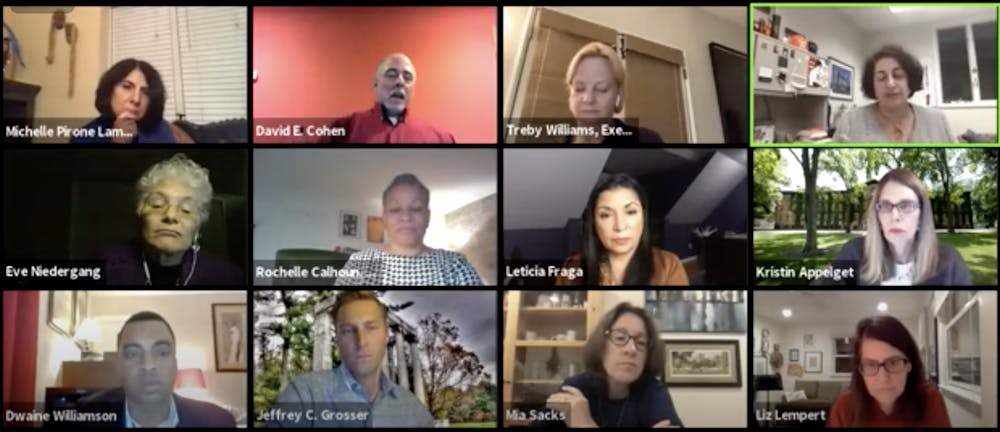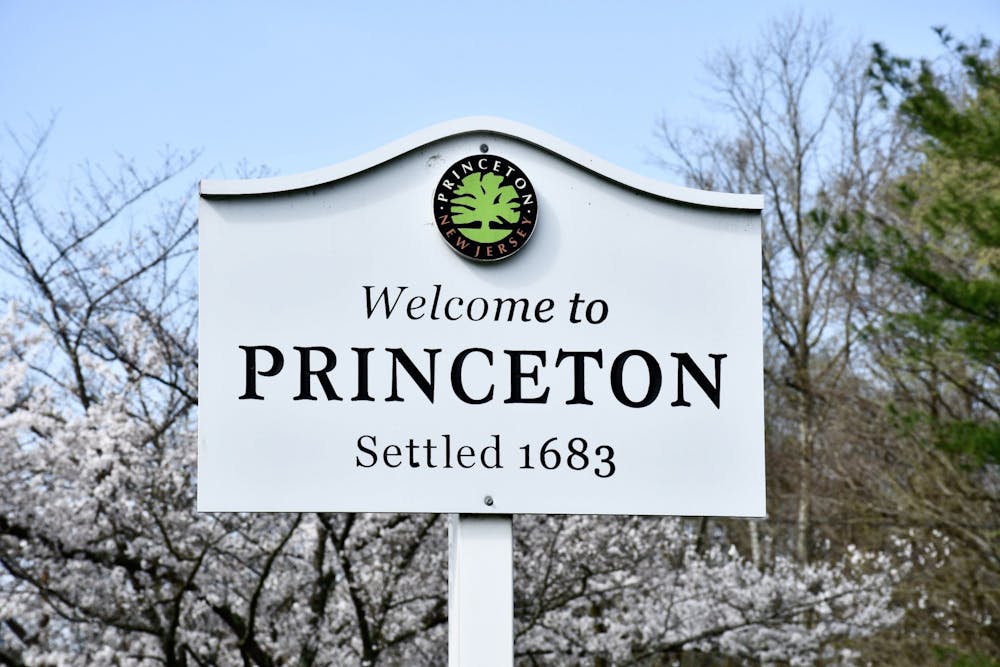At a Princeton Council meeting on Dec. 14, Vice President for Campus Life Rochelle Calhoun told local officials that the University will begin a “community walk program” this spring to help monitor public health compliance for students living locally.
For a third of Monday’s three-hour Council meeting, administrators described the University’s spring plans and fielded questions from Mayor Liz Lempert and Princeton’s six town council members. They discussed aspects of the planning process particularly of interest to locals, including testing, travel, and regulations for students living near campus.
Near the end of the meeting, the Council also voted unanimously in favor of a resolution approving a voluntary contribution agreement between the University and municipality, under which the University will provide $8.482 million to the town through 2022.
During the hour-long segment, Executive Vice President Treby Williams ’84 clarified that the University “does anticipate” students will rent properties locally this spring. Students living within Mercer County or Plainsboro can access campus if they participate in biweekly testing and abide by the University’s public health guidelines.
“We are trying very intentionally to keep down the possibility that our off-campus residences become a location for gathering, in a way that we would not see as health-minded or appropriate,” Calhoun added.
The Campus Advocate Program launched in October will continue monitoring zones and distributing information, as well as handing out supplies like hand sanitizer, disinfecting wipes, and face masks on campus this spring. Calhoun added that University employees will also monitor activity on and off campus through a “campus walk program” beginning this spring.
“[The program] will have individuals walking not only on our campus ... but once we understand the neighborhoods where students will be housed, we will be walking those neighborhoods,” she said.
Calhoun also emphasized the benefits of communication with Princeton residents.

“We benefit a great deal from our community partners who alert us to any violations or perceived violations of those rules,” Calhoun said. “And so we want to encourage the community to just let us know if there’s a household that we need to visit, or if there are violations or potential violations we need to investigate.”
Responding to a question from Councilwoman Eve Niedergang regarding the awkwardness and potential hesitancy involved in reporting violations, Calhoun said that the University’s approach “is always to help students correct their behavior, and if that’s not possible or the behavior is too egregious, then we get to the more serious response and disciplinary action.”
“A lot of what we’ve heard is that [Princeton residents] don’t want to get students ‘in trouble,’ and so we want to encourage people — as we are encouraging our students — as we talk about community care and community responsibility, which will be so paramount to our ability to do this well,” she added. “The ‘in trouble’ piece is less of a concern than making sure we’re healthy and safe.”


Administrators also discussed a recent New York Times feature about community spread and deaths in college towns. Commenting on the relevance of the story’s findings to Princeton, Williams said the piece did not distinguish between college communities with comprehensive testing and reasonable restrictions, and those that did not.
She also emphasized the point, noted in the Times piece, that viral transmission in classrooms and during official campus events has been limited and many colleges and officials have pointed to bars and fraternity houses as areas facilitating spread.
“Eating clubs on Prospect Avenue will remain closed throughout the end of the academic year,” she emphasized. “In addition, Princeton students make up a much smaller portion of the county population compared with the schools that were mentioned in the article.”
Additionally, she noted that there has been “no transmission from students to faculty/staff or vice versa” throughout the University’s 16 weeks of asymptomatic testing.
Asked by Mayor Liz Lempert what would occur if community spread from campus did occur and overwhelmed resources, Executive Director for Environmental Health and Safety Robin Izzo said the University is equipped to conduct contact tracing for the campus community and “could certainly extend that more, take on more of that responsibility, for any cases associated with our campus.”
However, Williams confirmed that the University cannot extend testing beyond the campus community to other Princeton residents, given the nature of the University’s on-campus testing license.
Later in the meeting, the Council also unanimously passed a resolution approving a voluntary contribution agreement between the University and the municipality. Effective through the end of 2022, the University has pledged over $7 million in unrestricted funding, in addition to $250,000 toward constructing a new facility for the Municipal Department of Public Works equipment storage, and over $300,000 to the town’s fire department.
“This financial support helps to provide the municipality with funding towards the critical need of our department to be on the ready for any emergency,” Councilwoman Michelle Pirone Lambros noted. “We’ve seen, over this past year since we added six career firefighters, an increase in our response times.”
The University has provided nearly $22 million in voluntary contributions since the current agreement began in 2014, according to a release.
During the Council meeting, Pirone Lambros also highlighted other recent partnerships between the University and town, specifically referencing the University’s $350,000 contribution to the Princeton Small Business Resilience Fund, which provides grants to struggling small businesses in Princeton.
“Throughout the COVID pandemic the town and the University have worked together creatively and collaboratively to meet many challenges,” University President Christopher Eisgruber ’83 said in a statement. “The extension of the voluntary contribution agreement and the financial support that it provides for municipal operations is a further reflection of the University’s ongoing support for the community.”
The Princeton Council’s next regular meeting will take place on Dec. 21 at 7 p.m. EST, and a full recording of Monday’s meeting is available online.








